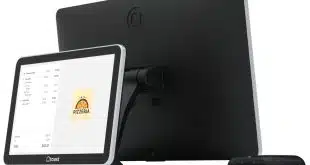The Shazam electronic funds transfer network on Wednesday announced it is making available across its network a mobile-payments service that lets stores, tradesmen, and other merchants accept PIN-debit transactions as well as credit and signature-debit payments. With the rollout, the service is available to nearly 1,500 member financial institutions and their client merchants. Shazam’s network covers some 42 states. The new service is the first such product to include PIN debit acceptance.
The mobile system works on phones or tablets running the Android or Apple iOS operating systems and relies on technology from a Fort Lauderdale, Fla.-based vendor called Adaptive Payments. It was announced late in August and has been piloted with merchants for most of the time since, Dan Kramer, senior vice president of marketing and merchant operations for the Des Moines, Iowa-based network, tells Digital Transactions News. Kramer refuses to give details about the pilot other than to say most participating merchants are in Iowa and that “utilization is high” among cardholders. Now that the service is available network-wide, he estimates that the commercial service will begin operation in 90 to 100 days.
There is no distinct interchange pricing for the service currently, but pricing specific for mobile transactions will be introduced this spring when the network rolls out its new overall schedule of rates, Kramer adds. He can't comment further on mobile pricing until then, he says.
With the new service, consumers enter their PIN on their own mobile phone after swiping their card through a cradle attached to the merchant’s phone. This so-called out-of-band authentication divorces the PIN entry from the transaction device, which some experts say helps keep the PIN secure. The form-fitted cradle, which also charges the phone and indicates whether it has a cellular signal, contains a mag-stripe swiper that encrypts transactions at the read head using the Triple-DES protocol. The reader comes from ID Tech, a Cypress, Calif.-based maker of card readers and PIN pads.
The underlying platform, called Pentagon, comes from Adaptive Payments, which Shazam has been working with to enable PIN debit for online transactions. A year ago, Shazam invested in the company, though without specifying the amount. With the Pentagon platform, transaction messages flow first to Adaptive Payments’ servers, where the company matches them with the PINs entered by consumers through the separate mobile channel. The complete transaction set is then delivered to the Shazam switch.
Kramer says Shazam member institutions, which own the network, are interested in enabling PIN debit for mobile point-of-sale transactions because of the popularity among consumers of both PIN transactions and mobile devices. “It’s habit,” he says. “They’re used to entering their PIN and want to be able to do it everywhere.”
The payment form also sustains lower fraud than signature debit. Fraud losses on signature debit were 7.5 times greater than the losses on PIN-debit transactions in 2009, for example. That advantage has taken on renewed importance with pricing restrictions imposed on big banks by the Federal Reserve that set interchange rates at the same level for both types of debit. The new rules, which slash interchange on average by more than 40% for banks with more than $10 billion in assets, took effect Oct. 1.
The availability of PIN debit for mobile acceptance might appeal to issuers looking to cut transaction expense, says Patricia Hewitt, director of the debit advisory service at Mercator Advisory Group, Maynard, Mass. For issuers struggling with fraud on signature debit, she says, “if they can move transactions to PIN debit, they would like to do that.” Merchants, too, could be attracted to PIN debit’s lower costs and the ability to offer the payment type in a so-called line-busting scenario, where clerks armed with smart phones or tablets allow customers to check out while standing in line at cash registers.
As the only major EFT network owned by its members, Shazam may have an edge in competing with other networks, if not with mobile-acceptance services such as Square or GoPayment, offered by software giant Intuit Inc. The other big networks—Star , NYCE, and Pulse—are all owned by corporations whose overarching agendas can subordinate network initiatives or drain off network resources, Hewitt says. Star is owned by First Data Corp., NYCE by Fidelity National Information Services Inc., and Pulse by Discover Financial Services. “That’s allowing Shazam to be a little more nimble,” Hewitt argues.





